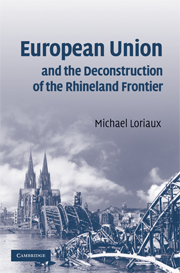Book contents
- Frontmatter
- Contents
- List of plates
- List of figures
- Acknowledgments
- 1 Myth and geopolitics of the Rhineland frontier
- 2 Trans Rhenum incolunt: the inauguration of the Rhineland frontier
- 3 A “principality of priests”: the inauguration of Europe
- 4 Anonymity and prosperity
- 5 The great antecedent cracking
- 6 Coups de force: Ossian and the département
- 7 Wacht am Rhein: the Ossianic fracture of Rhineland space
- 8 Carolingian discourse and Rhineland pacification
- 9 Spatial representation and the political imagination
- Index
7 - Wacht am Rhein: the Ossianic fracture of Rhineland space
Published online by Cambridge University Press: 06 July 2010
- Frontmatter
- Contents
- List of plates
- List of figures
- Acknowledgments
- 1 Myth and geopolitics of the Rhineland frontier
- 2 Trans Rhenum incolunt: the inauguration of the Rhineland frontier
- 3 A “principality of priests”: the inauguration of Europe
- 4 Anonymity and prosperity
- 5 The great antecedent cracking
- 6 Coups de force: Ossian and the département
- 7 Wacht am Rhein: the Ossianic fracture of Rhineland space
- 8 Carolingian discourse and Rhineland pacification
- 9 Spatial representation and the political imagination
- Index
Summary
Discursive coups de force “re-presented” European space by ascribing “reality” (in the common sense of the term) to something “imaginary” (in the common sense of the term). The epics of Ossian inaugurated a new ontopology by locating “the nation” archeologically, by signifying a “people,” rooted from the dawn of history in a place, speaking the “language of the place,” and marking the place culturally. The French département “brought to light” the new ontopology by locating it spatially, by effacing rival customary names, by “clearing a space” for the peuple as nation. Modern scholarship generally supports the claim that the nation is an eighteenth-century invention. Forgeries, fashion, and militant historiography helped to establish nationhood in the social imaginary. States were enticed or obliged to engage nationhood's (de)legitimating power. They recast themselves as defenders of the nation, and helped assure the authority of the new discourse not only through oratory, but through cultural investment (museums, monuments), compulsory schooling, and military service. Ernest Gellner emphasizes the importance of state-instituted education. The “monopoly of legitimate education,” he argues, was more crucial to nationhood's success than the monopoly of legitimate violence. Benedict Anderson stresses the importance of literary production, as a capitalist industry. “Print capitalism” halted and rolled back linguistic entropy – the tendency of spoken, unwritten languages to divide and diverge infinitely – and thus provided the linguistic conditions for “a new form of imagined community, which in its basic morphology set the stage for the modern nation.”
- Type
- Chapter
- Information
- European Union and the Deconstruction of the Rhineland Frontier , pp. 212 - 256Publisher: Cambridge University PressPrint publication year: 2008



